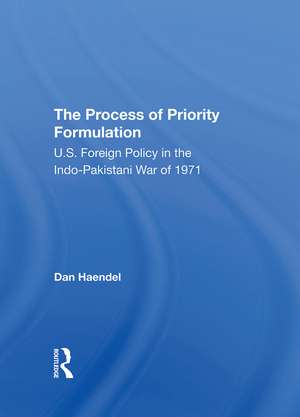The Process Of Priority Formulation: U.s. Foreign Policy In The Indopakistani War Of 1971
Autor Dan Haendelen Limba Engleză Hardback – 27 apr 2020
Preț: 773.83 lei
Preț vechi: 1033.06 lei
-25% Nou
Puncte Express: 1161
Preț estimativ în valută:
148.08€ • 158.34$ • 123.46£
148.08€ • 158.34$ • 123.46£
Carte tipărită la comandă
Livrare economică 18 aprilie-02 mai
Preluare comenzi: 021 569.72.76
Specificații
ISBN-13: 9780367295387
ISBN-10: 0367295385
Pagini: 448
Dimensiuni: 157 x 220 mm
Greutate: 0.99 kg
Ediția:1
Editura: Taylor & Francis
Colecția Routledge
Locul publicării:Oxford, United Kingdom
ISBN-10: 0367295385
Pagini: 448
Dimensiuni: 157 x 220 mm
Greutate: 0.99 kg
Ediția:1
Editura: Taylor & Francis
Colecția Routledge
Locul publicării:Oxford, United Kingdom
Cuprins
Westview Replica Editions -- Introduction -- The Indo-Pakistani Conflict and the Cold War -- The Unfolding of a Crisis -- from Noncrisis to Middle-Level Crisis -- The Structure of Decision-Making -- U.S. Decision-Making: Organization and Policy -- Application of Decision-Making Theory to Middle-Level Crisis -- The Rational Man Model: The Rationale of the Nixon Approach -- The Psychological Model: the Pique Theory -- The Incremental Model: Change or no Change -- The Global-Regional Controversy a Problem of Focus and Desirabilities -- Conclusion
Notă biografică
Dan Haendel, a captain in the U.S. Army, is an assistant staff judge advocate at Fort Belvoir, Virginia. He received J.D. and Ph.D. degrees from the University of Pennsylvania, and was previously a research associate at the Foreign Policy Research Institute and a member of the editorial research staff of Orbis.
Descriere
This book explores how foreign policy objectives and priorities are formulated by decision makers in the U.S. government by examining the decision-making process during the Indo-Pakistani War and focusing on the behavior of government institutions as they attempted to cope with the events of 1971.
